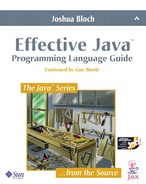In 1996 I pulled up stakes and headed west to work for JavaSoft, as it was then known, because it was clear that that was where the action was. In the intervening five years I've served as Java platform libraries architect. I've designed, implemented, and maintained many of the libraries and served as a consultant for many others. Presiding over these libraries as the Java platform matured was a once-in-a-lifetime opportunity. It is no exaggeration to say that I had the privilege to work with some of the great software engineers of our generation. In the process, I learned a lot about the Java programming language—what works, what doesn't, and how to use the language and its libraries to best effect.
This book is my attempt to share my experience with you so that you can imitate my successes while avoiding my failures. I borrowed the format from Scott Meyers's Effective C++ [Meyers98], which consists of fifty items, each conveying one specific rule for improving your programs and designs. I found the format to be singularly effective, and I hope you do too.
In many cases, I took the liberty of illustrating the items with real-world examples from the Java platform libraries. When describing something that could have been done better, I tried to pick on code that I wrote myself, but occasionally I pick on something written by a colleague. I sincerely apologize if, despite my best efforts, I've offended anyone. Negative examples are cited not to cast blame but in the spirit of cooperation, so that all of us can benefit from the experience of those who've gone before.
While this book is not targeted solely at developers of reusable components, it is inevitably colored by my experience writing such components over the past two decades. I naturally think in terms of exported APIs (Application Programming Interfaces), and I encourage you to do likewise. Even if you aren't developing reusable components, thinking in these terms tends to improve the quality of the software you write. Furthermore, it's not uncommon to write a reusable component without knowing it: You write something useful, share it with your buddy across the hall, and before long you have half a dozen users. At this point, you no longer have the flexibility to change the API at will and are thankful for all the effort that you put into designing the API when you first wrote the software.
My focus on API design may seem a bit unnatural to devotees of the new lightweight software development methodologies, such as Extreme Programming [Beck99]. These methodologies emphasize writing the simplest program that could possibly work. If you're using one of these methodologies, you'll find that a focus on API design serves you well in the refactoring process. The fundamental goals of refactoring are the improvement of system structure and the avoidance of code duplication. These goals are impossible to achieve in the absence of well-designed APIs for the components of the system.
No language is perfect, but some are excellent. I have found the Java programming language and its libraries to be immensely conducive to quality and productivity, and a joy to work with. I hope this book captures my enthusiasm and helps make your use of the language more effective and enjoyable.
Joshua BlochCupertino, California April 2001
